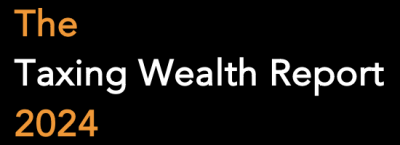The following recommendations have been made so far and will go on to form part of the Taxing Wealth Report 2024:
- Restricting pension tax relief to the basic rate of income tax might raise £14.5 billion of additional revenue per annum.
- Abolishing the VAT exemption for financial services within the UK might raise £8.7 billion of additional tax revenue per annum.
- Reforming national insurance charges on higher levels of earned income in the UK might raise an additional £12.5 billion of tax revenue per annum.
- Aligning capital gains tax and income tax rates in the UK might raise more than £12 billion in additional tax a year.
- Abolishing capital gains tax entrepreneur’s relief, which might raise approximately £2.2 billion of additional tax a year.
- Recreating an investment income surcharge in the UK tax system might raise up to £18 billion of extra tax revenue a year.
- Capping the rate at which tax relief is given on charitable donations under Gift Aid might raise £740 million in tax a year
- Abolishing the VAT exemption for services supplied by private schools might raise £1.6 billion in tax a year
- The UK needs better estimation of its tax gap to prevent the illicit accumulation of wealth. No tax estimate has been made as part of this recommendation.
- Capping ISA contributions to £100,000 in a lifetime might raise £100 million in tax a year.
- Reforming the administration of corporation tax in the UK might raise at least £6 billion of tax a year.
- Increasing the corporation tax rate for the UK’s largest companies could raise £7 billion in tax annually.
- Reducing the annual exempt amount of capital gains a person might enjoy a year to £1,000 might raise at least £0.4 billion of additional tax
- Charging capital gains tax on the final disposal of a person’s main residence might raise £10 billion of tax a year.
- The UK needs to undertake tax spillover assessments if tax abuse is to be beaten.
- Abolishing the inheritance tax exemption on some funds retained in pension arrangements at the time of a person’s death might raise £1.3 billion a year.
- Reforming inheritance tax business property relief might raise £3.2 billion of tax a year.
- Reforming inheritance tax agricultural property relief might raise £1.0 billion of tax a year.
- Reforming Companies House might raise £6 billion of tax a year.
- Reforming the rates at which inheritance tax is charged might make the tax considerably more progressive, even if it does not raise revenue.
- Restricting charity tax reliefs to prevent their abuse is important to protect the charity sector from risk.
- Reintroducing close company rules for income and corporation tax could raise at least £3 billion of tax a year
- Abolishing the domicile rule for tax purposes might raise £3.2 billion of tax revenue a year.
- Council tax reforms are essential to increase the progressivity of local taxation.
- The reform of the use of ISA funds could result in the saving of at least £3.7 billion of tax subsidies a year and release £70 billion a year for investment in a UK Green New Deal
- Reforming the conditions attached to pension tax relief could release £35 billion a year for investment in a UK Green New Deal
- Reforming student taxation is required to create horizontal and vertical tax equity within our tax system and would cost £4 billion a year.
- Removing existing anomalies within the UK system that prevent the delivery of tax justice might cost £19.1 billion per annum
Cumulatively, these recommendations have a total tax-raising potential of approximately £92 billion per annum, on top of which an additional £35 billion per annum from pension savings and £70 billion from ISA savings might be released for investment in social and green infrastructure projects. Total sums released might exceed £200 billion over annum as a result.
It is stressed that it is not necessarily suggested that any government undertake all these proposals simultaneously, although some are noted to be conditional on others taking place. The noted estimates include reductions in tax charges exceeding £18 billion per annum that would only be appropriate if other recommendations were accepted.





